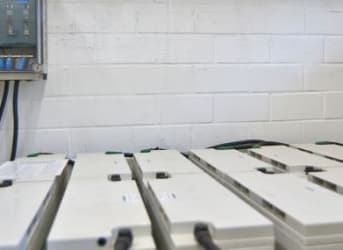So far, the PV storage market has been largely dominated by the Tesla Powerwall System which has received more than 100,000 bookings and will be available for sale this summer in the U.S. Available in 7 kWh and 10 kWh models, the Powerwall systems will have an average cost of $429 / kWh and $350/ kWh respectively. The total approximate cost of a rooftop solar array and a Powerwall system through Solar City’s Homebuilder program would stand at around $3,000 to $3,500.
Although the costs associated with energy storage are still quite high, the issue of tackling intermittent power generation from renewables such as solar and wind energy and regulating the electric grid have increased the importance of the energy storage industry significantly. Energy storage has captured the attention of utilities, residential users and commercial businesses hoping to cut both costs and their carbon footprint. There has been growing interest from global players such as GE, Siemens, ABB and Panasonic, who are now planning to enter the PV storage market.
In fact, Panasonic, which manufactures and supplies lithium ion batteries to Tesla Motors, is now set to enter the PV storage market itself. The Japanese electronics giant is planning to roll out its own home batteries in Europe. Does this mean that Tesla now has its first real, global competitor? Related: Aussie PM Ousted As Commodities Pressure Proves Too Much
Panasonic to roll out its energy storage batteries beginning in Germany
Europe is considered by many as one of the most lucrative energy storage markets after the U.S. As Tesla plans to enter the European market later this year, Panasonic may beat them to the punch by offering its residential battery systems in Germany. The decision to enter Germany is a sensible one as it is one of the biggest consumers and producers of renewable energy in the world. The Japanese electronics giant would also launch its product in Australia after a successful launch in its domestic market Japan. After Germany, Panasonic hopes to launch its residential battery system in the UK, France and other major European countries.
The Panasonic residential battery has a storage capacity of 8 kWh and an output of 2 kWh. It is slim, robust, dustproof and has the capability of aligning with existing residential solar PV systems. The Panasonic home battery can currently replace around 70 percent of a home’s electricity needs. “We are not far from achieving 100 percent in the future. The time it will take to reach that goal depends on the region. If you are in the Nordics, you need a lot of energy in the winter, when you don’t get much light,” Panasonic Europe CEO Laurent Abadie said at the IFA electronics show in Berlin in early September. The company is aiming to generate close to $83 million in revenue by the 2018 from the residential storage sector outside Japan.
Why is Panasonic’s entry to the energy storage market so significant?
There have already been some high profile players who announced their entry in the energy storage market. Auto giant Daimler AG already announced its entry in the German energy storage market this June by offering its ‘Mercedes Benz’ branded lithium ion batteries for both commercial and residential usage. Even General Electric (GE) is now planning to enter this market and wants to become a major player in energy storage (although it is currently targeting industrial battery systems) in the near future. "We believe in the space and its ability to grow, we think we can be a sizable player within it, and that’s really what we’re intending to do," said Jeff Wyatt, General Manager for GE’s energy storage division. Related: OPEC Lowers Global Demand Growth Expectations For Oil In 2016
So what is it that makes Panasonic’s entry so significant? To begin with, its close relationship with Tesla Motors stands out.
Panasonic and Tesla Motors Inc. signed a cooperation agreement last year to work together on the upcoming ‘Gigafactory,’ which will manufacture batteries for stationary storage and Tesla’s electric vehicles on a large scale. Panasonic is the supplier of the lithium ion batteries for Tesla’s Gigafactory and is also an investor in the related machinery, equipment and tools needed for the massive facility.
As a result, Panasonic is already a major stakeholder in the success of Tesla’s battery systems. With one of its factories located in its domestic market (Japan), Panasonic is in a position to gain a cost advantage when compared directly with Tesla. Moreover, a report in October 2014 stated that Tesla paid around $180/kW to Panasonic for their batteries. That suggests that Panasonic has lower production costs than Tesla at present, which could be a deciding factor on who captures the PV storage market in the coming few years. "Long term, energy storage is the answer to a lot of issues that need an answer, but the cost has to come down,” Tom Weaver of American Electric Power Inc. stated. It is clear that a player who can balance technology with operating costs would come out as a clear winner in the near future. Related: Oil Price Increase Will Not Come Fast Enough To Save Alberta

Image Source: PWMagazine
Also, one has to note that with a market share of more than 20 percent, Panasonic is currently the biggest lithium ion battery cell producer in the world today. With the entrance of Tesla and Panasonic, the competition in Europe’s PV storage market is sure to heat up over the next few years. That is very good news for solar companies looking to pair their solar panels with home batteries. It is also good news for consumers who are looking for both.
By Gaurav Agnihotri for Oilprice.com
More Top Reads From Oilprice.com:
- OPEC Is Winning The Price War Says IEA
- Norway Has Nothing To Fear From Oil’s Downturn
- BMW Going All-Electric


















